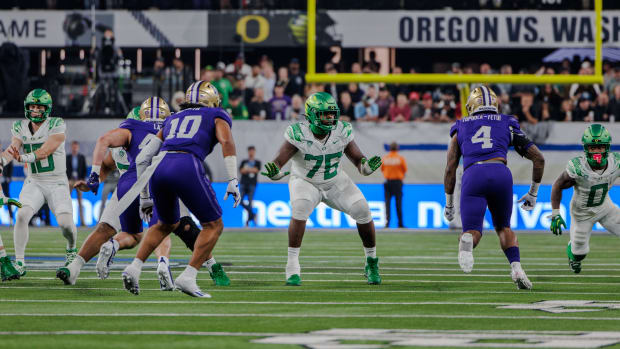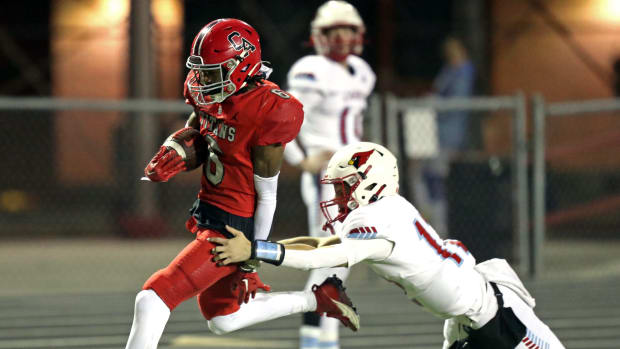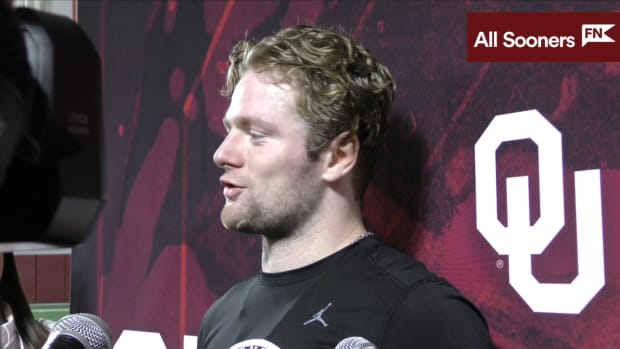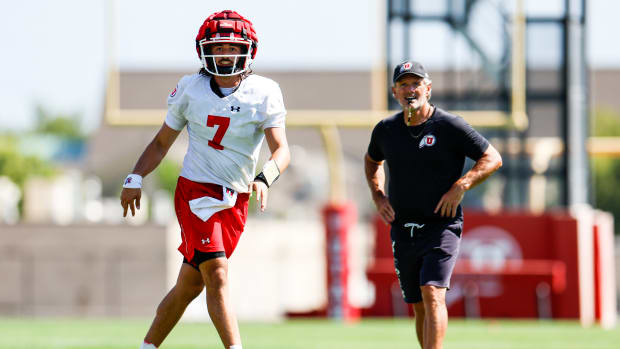One miracle short: Auburn's turnaround under Gus Malzahn

Kris Frost (17) and Auburn lost the BCS title game after Florida State scored with 13 seconds remaining.
Harry How/Getty Images
PASADENA, Calif.-- Tre Mason didn't need to be sorry for anything, but the Auburn tailback couldn't choke back his remorse on Monday night. "I apologize to the Auburn family and the rest of the fans that we didn't finish," Mason said after the Tigers lost to Florida State 34-31 in the BCS title game. "We didn't finish what we started."
Mason had no reason to apologize. He ran for 195 yards against the Seminoles, catching a touchdown pass and rushing for a fourth-quarter score that seemed at the time like a crystal football-clincher. Then Florida State marched down the field for the winning touchdown. The Tigers came so close, but in a season full of miracles, they couldn't pull off one last one.
Still, the greatest miracle of this season wasn't quarterback Nick Marshall's Hail Mary pass to Ricardo Louis by way of safety Josh Harvey-Clemons' deflection against Georgia. It wasn't Chris Davis' 109-yard missed field goal return for a touchdown that won the Iron Bowl and ended Alabama's national title streak. It was the turnaround engineered by coach Gus Malzahn, his staff and those players. The Tigers went from 0-8 in the SEC last year to one play away from winning the national title.
They should never apologize for that.
Mason hurt because he had made a promise on Sept. 21 and -- despite its improbability -- damn near kept it. That night, athletic director Jay Jacobs stood on the soggy field at LSU's Tiger Stadium and pondered Auburn's first loss of the Malzahn era. The Tigers had fallen behind by three touchdowns early in the second quarter and would end up losing 35-21, but the defeat was different from the ones the team suffered toward the end of 2012. The players hadn't quit. Their second-half fight reminded Jacobs of the Auburn men he had known and been one of, the generation of Tigers who had endured three-a-day practices under coach Pat Dye. Those teams didn't win all their games either, but they made sure their foes remembered with every ache the morning after that they had played Auburn.
MANDEL: FSU back on top with thrilling win
Malzahn had promised during his interview that this team would play like those ones. He hired former Tigers Dameyune Craig and Rodney Garner as assistants to instill the program's old standards in its current players. As Jacobs considered the grit he had witnessed in the second half, Mason approached. "He said, 'Mr. Jacobs, we're going to win the rest of them,'" Jacobs remembers. "I said, 'Ohhhhkaaay.'"
Jacobs wanted to believe, but how could he after what he had seen a year earlier? The final loss of 2012, a 49-0 thrashing at Alabama's Bryant-Denny Stadium, still haunted him. The Tigers had been crushed by their rivals, and the Crimson Tide rolled from there to an SEC title and their third BCS championship in four seasons. Auburn, meanwhile, had finished 3-9 and had failed to win an SEC game for the first time since 1980. Less than two years after coach Gene Chizik hoisted the BCS crystal trophy, the Tigers were a conference punchline, and not just on the field. In '11, four players had been kicked off the team for their roles in an armed robbery, and the internal issues only intensified as the program's on-field product got worse. Jacobs realized what he had to do. "I knew I was going to fire Gene," he said.
Jacobs and a search committee that included Heisman Trophy-winning alums Pat Sullivan and Bo Jackson and Tiger-turned-pharmaceutical executive Mac Crawford zeroed in on Malzahn, who had been Auburn's offensive coordinator under Chizik before leaving after the 2011 season to become the head coach at Arkansas State. During Malzahn's interview, it became clear that he had stayed in touch with friends in the program and knew what was ailing the Tigers. He presented a plan to fix the problems. Players needed to be tougher. They needed to feel the coaches treated all of them equally. They needed to be accountable to one another. To the committee members, Malzahn came off as an insider with an outsider's perspective. "He kept saying, 'We've lost our edge. We've lost what Auburn is,'" Jacobs said. "As four former football players, we knew exactly what he was talking about."
ROSENBERG: Two magic years, one champ
Malzahn got the job on Dec. 4, 2012, and at his first team meeting he made a promise. "He said we were going to have the biggest turnaround in college football," Mason said. He started by installing Ryan Russell as Auburn's strength coach. On his first day on the job, Russell happened upon senior defensive end Dee Ford working out by himself. Russell pulled Ford aside and spent the next hour explaining how he planned to whip the Tigers into shape. Workouts would be more fun; instead of the soundtrack of players' grunts and shouts that filled the weight room in previous years, music would blare. Whenever a player set a new personal best on one of several exercises -- bench press, squat, power clean, vertical jump -- Russell would ring a bell and start an impromptu party.
It wouldn't be all smiles, though. For the offense to move at the tempo Malzahn preferred, and for the defense to handle the extra snaps caused by playing alongside such a fast offense, the players would need to be in peak condition. Ford, a workout addict who knows which security guard will let him into the complex after hours, was thrilled. "It's fun. And it's hard," he said of Russell's regimen. "And it's exactly what we need."
Before the Tigers could make miracles happen, they had to come together. During the spring, Malzahn put the Tigers through as many full-contact practices as he could to build toughness and forge bonds. Malzahn organized bowling nights and dinners with coaches and their families. In the summer he made all the players move back on campus because he wanted them to spend as much time together as possible. When preseason camp started, he got them hitting again.
Malzahn also brought in guest speakers to drive his message home. One was Navy Capt. Tom Chaby, the commanding officer of SEAL Team Five. In early August, Chaby explained to the Tigers that SEALs are trained to occupy every position on the leadership continuum. Even the lowest-ranking man may find himself in charge in battle, so he'd better be prepared. This fed into Malzahn's message that every player on the team was just as important as any other. "You just never know when you're in the right place at the right time to be a leader," Chaby remembers telling the players. After his speech an Auburn player told Chaby that the Tigers would "surprise some people" during the season. Chaby, who had spoken to Florida State two weeks earlier, noted that the Tigers didn't carry themselves much differently than the Seminoles. In spite of what a mess the 2012 season had been, Auburn possessed a quiet confidence.
Jacobs calls 2012 "the lowest point of all lows for the Auburn football family." The players wanted to prove to the fans who had stuck by them that they would represent the school better. "We owed them that," Mason said. "Putting them through what we put them through last year, we owed them a season like this."

After running for 195 yards in the title game, Tre Mason finished the season with 1,816 rushing yards.
Stephen Dunn/Getty Images
GALLERY: SI's best shots from title game




